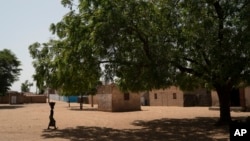As the world marks Earth Day, activists in Africa are calling for wealthier countries to take responsibility for climate change and do more to help developing countries cope with the repercussions.
In Africa, the climate crisis is threatening the livelihoods of millions and the availability of food and water. In recent years the continent has seen economic and population growth that has led to environmental degradation while suffering extreme climatic events such as floods, heatwaves and drought.
Speaking online at the Exponential Climate Action Summit, Susan Chomba, head of Vital Landscapes for Africa at the World Resource Institute, said regulation of land use needs to be prioritized to preserve nature.
“For instance, most of the remaining areas with high biodiversity are the same areas that are increasingly receiving a lot of pressure from farming to produce food for people to eat not just locally in Africa but via local supply chain,” Chomba said. “That emphasis on the issue of how we address the demand for luxury products, demand for overconsumption of things that are driving deforestation, that are driving land degradation is critical.”
Much of Africa’s climate crisis is blamed on heavy atmospheric pollution by developed countries. Although developed countries pledged to give $100 billion to developing countries to help them adapt to the effects of climate change, that funding, combined with eligibility requirements to receive, is not adequate.
John Recha, a climate scientist with the International Livestock Research Institute, said the priorities of donor and receiving countries are different when dealing with climate mitigation strategies. He said the funds come with conditions and restrictions that make it difficult for the nations to use them in ways they would prioritize.
“Instead, they must use the funds to sometimes do what the donors think is a priority,” Recha said. “That may not be necessarily what is a leading priority within the country.”
Fredrick Owino works with 16 African countries on how best to increase and preserve forests as one of the ways to mitigate global climate change. He said the funds to fight climate change come with many conditions that are difficult to fulfill.
“The commitments being made by some developed countries are not accessible, so we are trying to discuss among African countries how best we can access those funds,” Owino said. “They usually come as a part of a new requirement to report on our forests, a new arrangement of managing forest which our countries always find difficult to comply with.”
The U.N. Framework Convention on Climate Change promotes sustainable use and management of forests. Forests store carbon, and the carbon increases concentrations of greenhouse gases in the atmosphere.
Environmentalists are calling on African citizens and the world to take action and invest in the planet for a healthy environment and economy.




